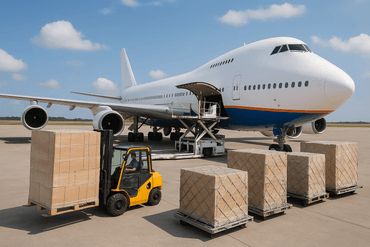
Preparing your China import Christmas campaign



Why preparing your China import Christmas campaign is so important
With less than 90 days to Christmas, the holidays are fast approaching. While most of us are still getting adjusted to fall, a lot of companies have been planning their ocean freight for months now. China is the leading country for importing to the US during the holiday season. Last year, China import goods contributed $2.83 billion to the continuously-growing shipping industry.
While dealing with a new vendor in China, it can take some time to get to know how Chinese companies operate. That said, doing a few smaller China import shipments in advance will allow you to learn about any quirks or hick-ups from potential suppliers.
Take control of your China import shipment
When importing from China, the best way to control this is to route the cargo from the US. It is entirely possible and much more transparent. But, it can be a challenge if the supplier is not as cooperative with your vendor as they are with their own. Sometimes, companies make money from the shipping cost, so taking that out of the equation creates problems for the vendor.
What happens when importers purchase goods under the FCA Incoterm is that the shipper is responsible for all origin charges. Sometimes the shipper does not settle the origin charges with the carrier, agent, or co-loader at origin so they don’t issue the original Bill of Lading until they get paid to hold onto the cargo.
This should not matter to the importer, as long as the shipper settles the charges at origin. But when they do not, all of a sudden cargo arrives and cannot be released. So in some cases, it can result in delay-related charges and additional storage charges that are the shipper’s liability.
Keep GRIs in mind
Every fall, peak season surcharges come into effect for inbound rates from Asia. Space and equipment become limited. So, planning as early as possible is best. Doing so will help with avoiding higher costs and provide a little cushion in terms of any congestion delays that may occur.
GRI is key when it comes to reducing costs. A GRI, or General Rate Increase, is the adjustment (usually an increase) of freight rates across shipping routes. This normally takes place at the start of every month. Shipping lines implement them to recover from a continual trend of lowering prices to remain competitive. While largely unavoidable, you can certainly take preventive measures to ensure you’re not too hard-hit by them. Read more about GRIs from our post on How To Survive A GRI, where you can also take our quiz to test your GRI knowledge!
Here’s an example of a rate increase announcement by Maersk Line for this year’s peak shipping season.
![]()
Once a GRI kicks in, your shipping rates could as much as double. The financial implications of not knowing how to manage GRIs isn’t a risk you should take. You don’t want to set a budget only to find out that you’ve burst it due to the implementation of a GRI you were unaware of. The good news is, you can avoid such surprises by doing sufficient research and having enough flexibility with your shipments. Now if this doesn’t motivate you enough to prepare your China import Christmas campaign early, I don’t know what will!
Transit times for your China import
Absolutely fundamental. Know this like the back of your palm to ensure that the supplier has the shipment ready on time to load the container onto the vessel. Transit times for all carriers usually range around 28 to 35 days. This varies according to the port of origin. But you should also take into account the other procedures involved in international shipping.
Start searching and locking down a freight forwarder a few weeks in advance. This gives you the advantage of having various sail dates and times to choose from. This way, the agent at origin and supplier also have enough time buffer to prepare their merchandise. This also means getting the shipment to the port ahead of time. This also ensures your shipment won’t be delayed just in case customs decide to conduct a random check. And this goes for both origin and destination. Starting early means avoiding potential shipping delay charges that may rack up.
That’s where the transparency of our system comes into play. With iContainers, you can look up rates to and from multiples countries in Asia. That way, you can avoid these pitfalls by doing everything through one stop. We also offer door-to-door services both to and from China.
Related Articles


